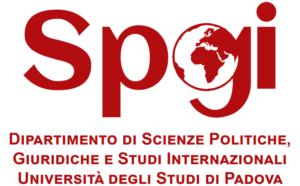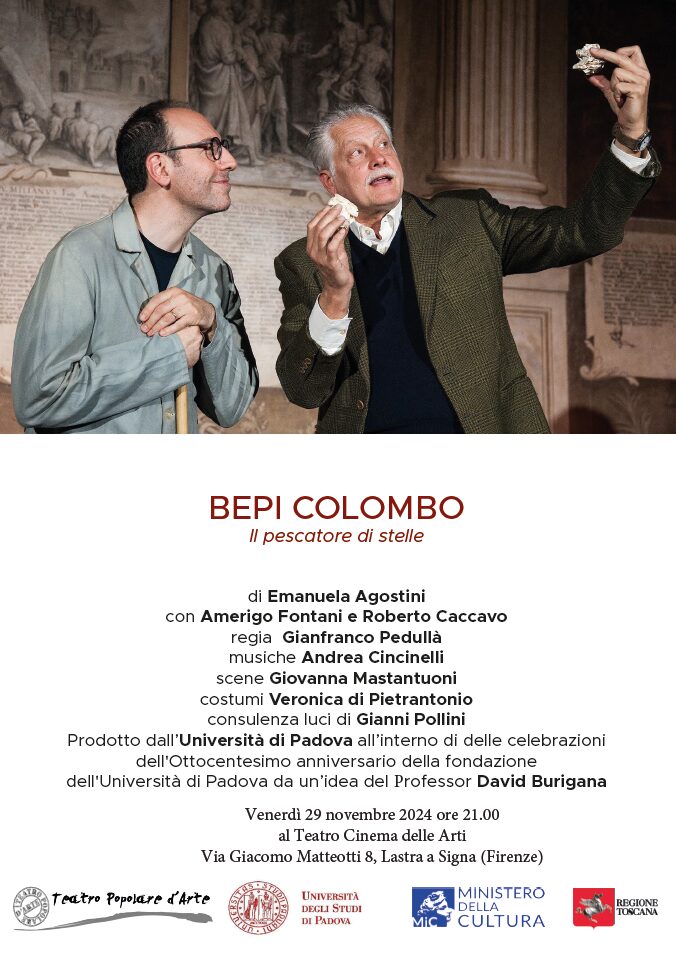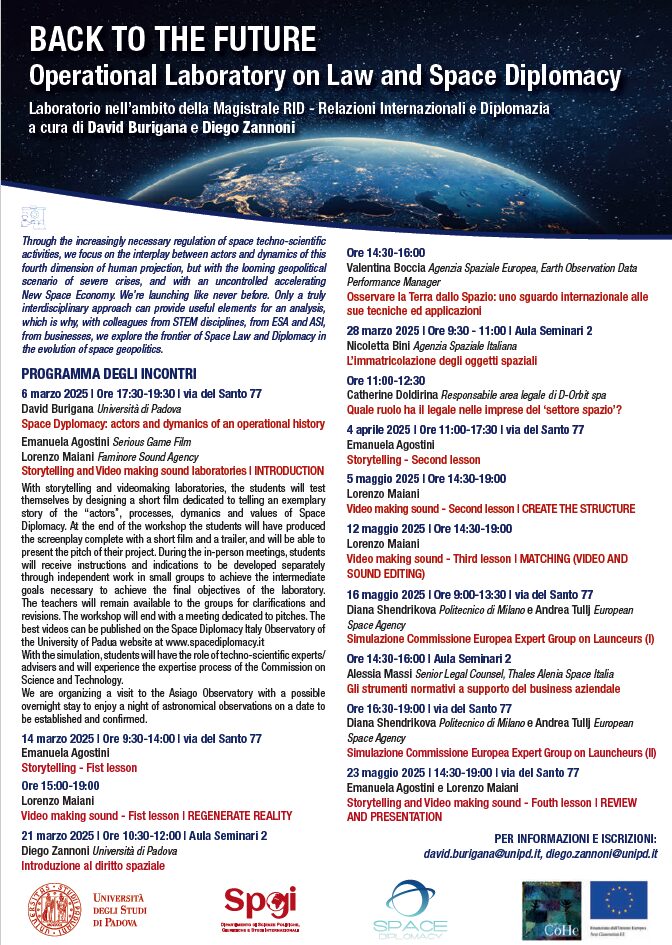
Eventi SPGI
Venerdì 29 novembre 2024 ore 21.00
BEPI COLOMBO
Il pescatore di stelle
L’Ateneo di Padova ha celebrato Giuseppe Colombo, da tutti conosciuto come Bepi Colombo,
matematico, fisico, ingegnere e un astronomo, che in passato con i suoi studi ha dato
importanti contributi allo studio del pianeta. Lo fa con lo spettacolo Bepi Colombo, Il pescatore
di stelle.
Lo spettacolo nasce in occasione delle celebrazioni dell’Ottocentesimo anniversario
della fondazione dell’Università di Padova da un’idea del Prof. David Burigana.
Lo spettacolo è dedicato alla figura di Bepi Colombo (1920-1984), che con il suo contributo
ha, tra l’altro, mo-dificato la storia dei viaggi spaziali. Nel suo studio di Padova, già
sofferente della malattia che lo porterà alla morte, lo scienziato si confida a un giornalista
affascinato dalla sua vicen-da umana e dalla forza delle sue intuizioni. Il racconto si
dipana lungo gli anni secondo un percorso a ritroso, accompagnando gli spettatori nei
luoghi raggiunti dal lavoro di Colombo: dall’università patavina allo Smithsonian Institution in
Massachuttes, dalla Parigi dell’ESA al JPL della NASA, dal chiuso del suo studio allo
spazio cosmico. Studioso itinerante in continuo movimento, al tempo stesso rigoroso e
geniale, solitario e estroverso, Colombo percepiva la responsabilità della ricerca
scientifica quale forma di arricchimento per l’intero genere umano e, in piena Guerra
Fredda, osava immaginare una maggiore collaborazione tra le potenze mondiali per
rispondere alle sfide globali, come lo stesso riscaldamento terrestre. L’iniziativa rientra nel
progetto “L’Università di Padova e lo Spazio. Dall’esplorazione roboti-ca e umana dello
Spazio alla Science Diplomacy” coordinato da David Burigana, docente Università di
Padova, con la consulenza scientifica di Enrico Lorenzini e realizzato con il patrocinio
del Dipartimento di Scienze Politiche, Giuridiche e Studi Internazionali SPGI e del CISAS
Centro di Studi e Attività Spaziali “Giuseppe Colombo”.

BACK TO THE FUTURE Operational Laboratory on Law and Space Diplomacy
6 marzo – 23 maggio 2025 Università degli Studi di Padova
BACK TO THE FUTURE: Operational Laboratory on Law and Space Diplomacy
Attraverso la regolamentazione sempre più necessaria delle attività tecnico-scientifiche spaziali, ci concentriamo sull’interazione tra attori e dinamiche di questa quarta dimensione della proiezione umana, ma con l’incombente scenario geopolitico di gravi crisi e con una New Space Economy in accelerazione incontrollata. Stiamo lanciando come mai prima. Solo un approccio veramente interdisciplinare può fornire elementi utili per un’analisi, motivo per cui, con colleghi delle discipline STEM, dell’ESA e dell’ASI, delle aziende, esploriamo la frontiera del Diritto e della Diplomazia Spaziale nell’evoluzione della geopolitica spaziale
Responsabili scientifici proff. David Burigana e Diego Zannoni

Conferenza
THE POLES, AN INTERDISCIPLINARY TOOL FOR ADVANCED TRAINING IN SCIENCE DIPLOMACY
Organized by: Department SPGI (Political Science Law and International Studies), University of Padua, Italy
Speakers:
- David Burigana, Professor, University of Padua, Italy: The Italian Long March To Poles: An Operational History
- Elena Calandri, Professor, University of Padua, Italy: The Poles And The Italian Approach To European Construction In A Changing World
- Alessandro Paccagnella, Professor, University of Padua, Italy: Microelectronics and the Poles Geopolitics
- Umberto Vattani, Ambassador, Venice International University, Italy: Italian Diplomacy from Science to Poles
- Rasmus Gjedssø Bertelsen, Professor, UiT – The Arctic University of Norway
- Federica Scarpa, Dr, IACN-Icelandic Arctic Cooperation Network
The history and geopolitics of the Arctic must be included in the more general framework of Science Diplomacy not only because it is one of the notable examples, but for the multiplicity of disciplines and technological typologies it involves. Similarly, this is what happens for Space, the fourth dimension of human exploration, but as the Space Economy shows due to the dependence on satellites for innovation in communications and Earth Observation applications. It is no coincidence that the Poles are not only the object of experimentation and use of space activities. Due to their positioning, they hold two of the most strategic satellite data reception bases, as well as being a place of use and experimentation for the frontier of microelectronics. Just two examples we’ll talk about. However, it is necessary to proceed with a truly interdisciplinary approach, that is, collaboration between techno-scientists and political scientists. The approach we start from is that of the history of the evolution of the international context and the positioning of Italy (D. Burigana, E. Calandri) but applying the concept of operational history to the Arctic and Antarctic, i.e. identifying in the past some elements – actors, dynamics – which can suggest trajectories on the present time. Interdisciplinarity is given by the relationship with fellow scientists, as in the case of Alessandro Paccagnella, physicist, world expert on the effect of radiation on chips, and with whom we have opened a course on Microelectronics and Globalization, and a Master’s in Science, Technology and resource management in the international context where the geopolitical role of the Poles is addressed. However, a strong interaction is needed with the students who participate not in courses, but in learning laboratories because we apply with them – in the schools, in the Master, in the courses – a methodology continuously updating topics, and analyzes since it is based on a communicative interaction with students playing simulation and storytelling workshops. It is at this point that the participation of witnesses from the recent past and actors of the present time who show the dynamics of Science Diplomacy, such as Ambassador Umberto Vattani, becomes essential. In this framework, we have started an oral history project, opening two new series of interviews on Science and Space Diplomacy at the Historical Archives of EU (Florence, Italy), because they are specialized in archival and oral history funds on the history of European construction, not only of the EU institutions. They have the archives from the European Space Agency and the European Science Foundation for example. The students participate in carrying out the interviews. In the renewed attention to Science Diplomacy by the Minister of Foreign Affairs and International Cooperation with the transition from 22 to more than 60 scientific and space attachés, for the first time the attachés’ conference was held outside the Ministry in a university, in Padua (2023), and at the Polytechnic of Turin (2024). In view of these two conferences, the Venice International University (VIU), a consortium of Italian and foreign universities, wanted by the President of the Republic Carlo
Azeglio Ciampi, and chaired by Ambassador Vattani, was the venue for two preparatory meetings with diplomats, academics, representatives of companies interested in Science Diplomacy from which the commitment to create two Observatories emerged, one on Science Diplomacy sciencediplomacy.it and one on Space Diplomacy spacediplomacy.it.




